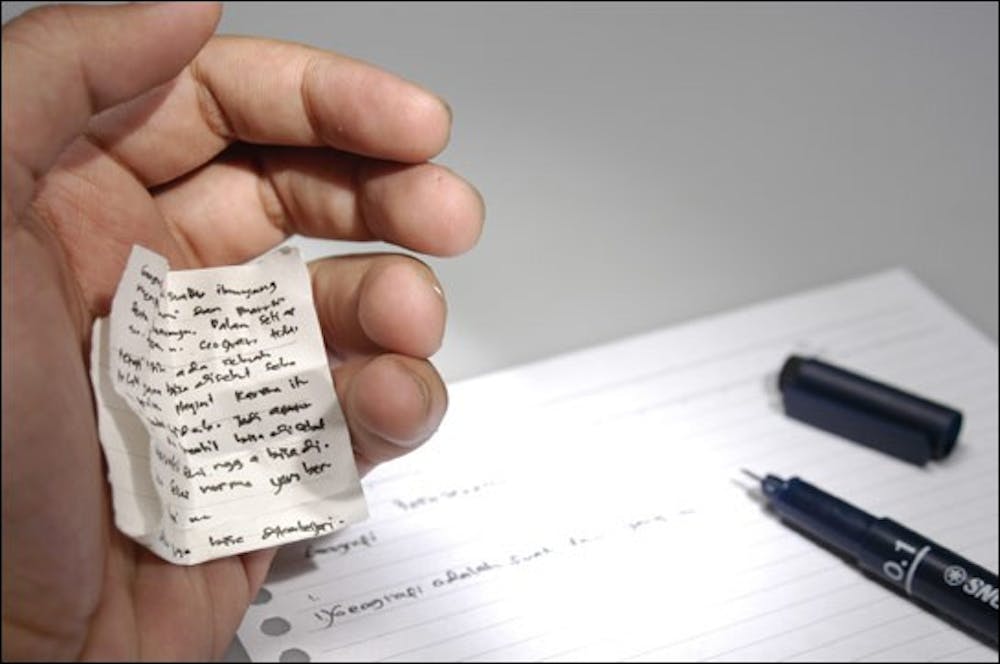National scandal inspires conversation on academic integrity at UP
(Photo Courtesy of Google Images)
By Enid Spitz, Staff Writer -- spitz13@up.edu
In early November, about 200 seniors in Professor Richard Quinn's business class at the University of Central Florida in Orlando passed an exam with unusually high scores, over a grade above their usual.
They cheated. One-third of the 600-person class obtained copies of the exam before they took it.
This is the largest recent case of cheating at UCF and has made national news, bringing up the issue of academic integrity for schools across the United States.
The cheating at UCF happened in a technologically advanced lab equipped with "anti-cheating cameras" and patrolled by monitors. All 600 seniors must retake the exam, and the cheating students now face an ultimatum: confess to receiving a copy of the exam before taking it or risk expulsion.
The University of Portland's code on academic integrity takes a firm stance on cheating: "Academic integrity is openness and honesty in all scholarly endeavors."
According to the code "each person is responsible for encouraging academic integrity in others by means of direct communication and personal example and for reporting breaches to the appropriate authorities."
At UP, cheating must be reported to both the dean of the student's college and to the college of the course in which the student cheated. The student's dean then handles discipline for the academic breach.
There are various levels of cheating, ranging from minor to serious, explained Br. Donald Stabrowski C.S.C, provost at the University of Portland.
"Choosing a shortcut is going to have a negative consequence every time," Daniel McGinty, academic adviser for UP's student athletes, said.
The consequences depend on the gravity of the cheating, ranging from a failing grade for the assignment or course to expulsion from the university. According to UP's code on academic integrity, any form of cheating "will not be tolerated and will be addressed … with all due gravity."
The University keeps accounts of cheating in students' files, where repeat offenses are treated more seriously than the first.
In his 15 years dealing with discipline at UP, Stabrowksi says he has seen only two or three cases come into his office. He explains that most cases are not serious enough to pass from the dean's office to his level, where expulsion is considered.
To prevent students from feeling the need to resort to cheating, UP provides resources like McGinty's advising for athletes and the Campus Writing Center to help students who may be struggling to manage their schoolwork.
Stabrowski says it is the goal of the University to educate students about cheating by explaining what it is and why it is wrong.
"I honestly don't think students know what cheating is," he said. Teaching students about proper citations, Stabrowski claims, is one of UP's main ways of combating academic dishonesty.
"I think cheating is an issue, but one we like to think we can do something about," Stabrowski said.
"It's also an opportunity for teaching." By the time seniors graduate, he hopes they will understand the pitfalls of cheating and live up to the University's claim of academic integrity.
"I don't sense a culture at UP that engenders cheating," Larry Williams, the athletic director for the university, said.
According to students, cheating is uncommon, but it does happen.
"About eight people were accused of plagiarism in my Biblical Traditions class last semester," junior Rebecca Hannon said. "I don't think it's a common occurrence, though; that was the only issue I've experienced."
According to US News and World Report, the use of the Internet and cell phones has transformed the way students cheat. In 2009, it published a survey in which two-thirds of students claimed they saw cell phones used to cheat. More than 50 percent admitted to copying information from the Internet.
"I don't think there's cheating in the traditional sense of ‘let me look at your test.' But I feel like plagiarism happens," junior Katie Hanson said.
However, many professors use websites such as TurnItIn.com to check students' work for plagiarism.
Professors can further prevent cheating, Stabrowski believes, by being careful about how they design their tests. Regardless of all the University's precautions, Stabrowski acknowledged that cheating can still happen and that it may sometimes go unreported.
"Then I hope there's a lot of guilt there," he said.
(Photo Courtesy of Google Images)








